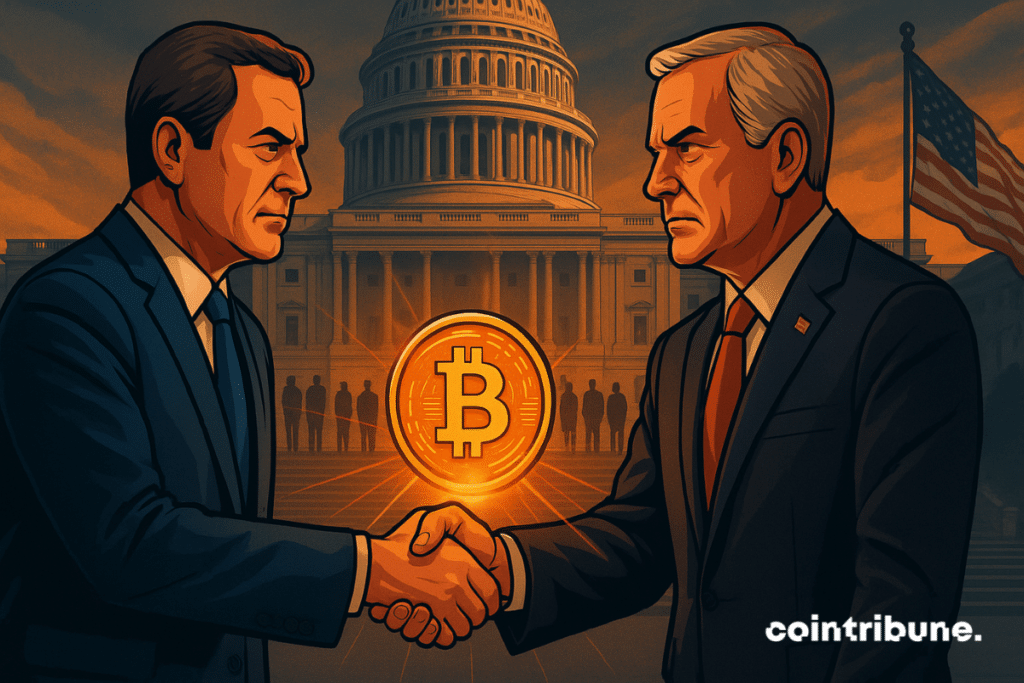12 Democrats Join the American Crypto Revolution
For the first time, Washington speaks with one voice on crypto. After years of partisan deadlocks and ideological battles, Democrats and Republicans are finally breaking their divides to build a common regulatory framework. Twelve Democratic senators have just announced their support for negotiations, accelerating the implementation of a law that could redefine the future of a market worth more than 4 trillion dollars.

In brief
- Twelve Democratic senators break their resistance and join the bipartisan effort
- Adoption aimed by the end of 2025, facing European and Asian regulatory competition
- A 4 trillion dollar crypto market awaiting final institutional legitimization
Towards Bipartisan Legislation on the Crypto Market in the USA
The shockwave is shaking the halls of the Capitol. While several legislative projects on crypto were already moving forward, twelve Democratic senators from the banking and agricultural committees, including Kirsten Gillibrand, Cory Booker, and Mark Warner, caught everyone off guard by calling for a collaborative approach with Republicans.
In a joint statement, they demand a strong bipartisan framework to avoid a law dictated by only one camp. This unexpected alliance disrupts the legislative balance.
Tim Scott, Republican chairman of the Senate banking committee, had anticipated this shift by betting on support from at least twelve Democrats. His intuition is confirmed: the bipartisan majority is forming and creating a legislative momentum now difficult to stop. Only Elizabeth Warren remains in direct opposition, denouncing “legislation dictated by the crypto industry“.
The convergence crystallizes around seven key pillars, including:
- a strengthening of the fight against illicit financing,
- a clarification of the status of crypto assets not considered as financial securities,
- increased transparency between the SEC and the CFTC to fill regulatory grey areas.
This harmonization reduces partisan divides and paves the way for a lasting compromise. Although Republicans control both chambers, Democratic support remains essential to ensure the sustainable adoption of the bill. The schedule is accelerating with initial votes organized at the end of September or early October, depending on ongoing negotiations between the banking and agricultural committees.
A Legislative Momentum That Accelerates Amid International Competition
This movement takes place in a rapidly changing regulatory landscape. The GENIUS Act, focused on stablecoins, has already been adopted by Congress and signed by President Donald Trump. Meanwhile, the Clarity Act, aiming to define whether a crypto is a security or a commodity, is still awaiting the Senate’s green light after overwhelming approval in the House with 294 votes to 134.
Meanwhile, international competition is intensifying. The European Union is structuring its market with the MiCA regulation, Hong Kong is aggressively attracting stablecoin issuers, and Singapore imposes severe restrictions on retail investors. This global fragmentation could destabilize some players but offers the United States a unique opportunity: to establish itself as the regulatory hub of reference for crypto.
Institutions are already anticipating this turn. With over 200 billion dollars in stablecoins in circulation, clear rules mean that insurance banks and pension funds can invest massively without fearing reversals.
BlackRock, Fidelity, and their competitors now have a legal framework to launch sophisticated crypto products, consolidating the American position in the global crypto ETF market. If the bipartisan momentum holds, it will be a new era of legal certainty for crypto opening in the United States, positioning the country as the global reference hub in the race for regulatory hegemony over digital assets.
Maximize your Cointribune experience with our "Read to Earn" program! For every article you read, earn points and access exclusive rewards. Sign up now and start earning benefits.

Fascinated by Bitcoin since 2017, Evariste has continuously researched the subject. While his initial interest was in trading, he now actively seeks to understand all advances centered on cryptocurrencies. As an editor, he strives to consistently deliver high-quality work that reflects the state of the sector as a whole.
The views, thoughts, and opinions expressed in this article belong solely to the author, and should not be taken as investment advice. Do your own research before taking any investment decisions.